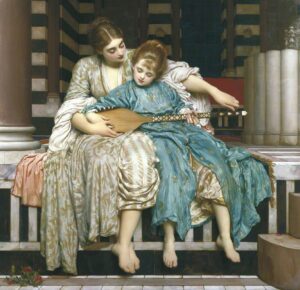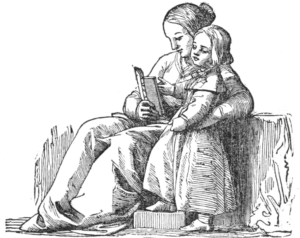
After months of wishing to do so, I am taking advantage of a free course from Hillsdale College called Classic Children’s Literature.
You may have seen this course advertised with its colorful promo extolling the vitality and efficacy of works like Treasure Island, Beauty and the Beast, and Aesop’s Fables.
Reading to one’s children is the second most important thing you can do for their well-being. It is bested only by giving them music. And when I say “music,” I mean music that emanates from someone’s own voice and own hands. Playing recordings or taking kids to performances bears much fruit. But neither rises to the same formative influence as singing even the simplest songs to them or playing music for them.
Taken together, a duet of dedicated reading and experiencing music really does ensure that a child enters adulthood with a respectable arsenal of useful strengths and powers of discernment. Now in case you think I’m overlooking the obvious, I am not. The cultivation of a child’s religious faith forms the inner column that transforms both literature and music. Ideally, parents, tutors, and every member of the child’s circle will work together to instill such a religious core into each little one.
So there we have the desired trio: strands of good music and classic children’s literature, woven into a vine of solid religious education. Each element of this trio circulates like the bloodstream, directing the child’s path, providing wisdom and balance while enhancing qualities like courage, honesty, creativity, and commitment.
Someone like me is not being nostalgic when mourning the waning of this marvelous trio. Our streets and prisons are full of evidence as to what happens when the spiritual, literary, and artistic forces necessary for a child’s development are lacking.
To take this a bit further, I was struck by a quote from William Kirkpatrick highlighted in the second session of the Hillsdale course:
The danger facing children’s literature does not come from the ogres and villains that haunt the pages of fairy tales and adventures stories; the danger lies, rather in the continued proliferation of normless books that cater to anxiety and self-absorption and have nothing to teach about life, except, perhaps, that whatever happens is okay. The danger is not that such books lead to a life of crime, but to a life of boredom, selfishness, and limited horizons.
Such havoc wreaked on children by “normless” books and media is legion these days. While dark, destructive paths can lure a child, today’s young people are equally threatened by never-ending spirals of self-absorption and pointless anxiety, the fruit of which, indeed, will be boredom, selfishness, and limited horizons.

As teachers and parents, this is a fate we need to fear. Fortunately, time-honored weapons, easy to access, were given us by our forefathers. A solid religious faith provides the first weapon, epitomized by the verse “Train up a child in the way he should go, and when he is old, he will not depart from it.” In fact, he may depart from it. But where there is nothing for him to return to, there can be no return. Conversely, where a foundation has been laid, a place to return throws open its arms.
The second weapon involves the magical combination of literature and the arts. Young minds stimulated by creativity and timeless literary ideals do branch out easily into other disciplines from science to math to engineering. So, yes, reading stories like The Little Engine that Could or Rapunzel two-hundred times, coupled with a few hundred renditions of songs like The Farmer in the Dell or You Are My Sunshine really will fuel a kaleidoscope of admirable traits and worthy desires.
Has there ever been a time when so much richness of resources has touched our individual homes and lives? We of course cannot take advantage of it all. But we do not need to have it all. We need a passionate commitment to that which is currently before our eyes or lilting from our tongues. The retelling of Johnny Appleseed while resting from raking leaves or a lullaby sung nightly by grandma will be remembered with affection and clarity a half-century later, long after other memories are gone.




I can’t wait to share this with my mom – this is exactly what she did for me and my siblings when we were young and I am eternally grateful for it. The power of story and song brought together in the context of deep communal faith should not be underestimated!
So beautiful! You are always such an encouragement. Thank you!
So happy to know that I am in such good company, as I just started that course! It, along with my daily reading of Scripture, has helped to wrest my attention away from the worrisome, current events. Thank you for all of your efforts to enhance our and our children’s lives! Now, to find a good read-aloud for two college age sons, both doing classes virtually…
Yessssss!
“Reading to one’s children is the second most important thing you can do for their well-being.” I’d love to see a study, or many, that prove this point, not just that reading is important or even essential, but that it is the first or second most valuable activity that an adult can share with a child. Seems like I saw something on the superiority of reading from a few years ago, but couldn’t find it again when I looked.
Thanks for an inspiring post!
So utterly profound!!! Thanks for the post. I am a product of this very foundation: religious, literary and songs/music.
Hello, Professor Carol! Thank you for the reminder! God Bless all, Shinwon
Dear Professor Carol,
You have succinctly and beautifully summarized the whole aim of Christian education- to predispose the heart and mind toward the good, true, and the beautiful through natural, everyday family practices like singing and reading. If we can only make our homes sanctuaries of civility (NO easy task!), we can at least stem the tide of cultural ruin.
Thank you for this, and I’ll be joining you in the Hillsdale course online!
This is truly right on! It’s what I saw my mother do with my younger sister. I did it with my daughter and my grandsons. The music is so important! Thank you for this!